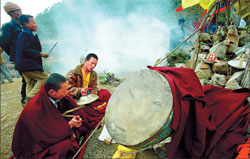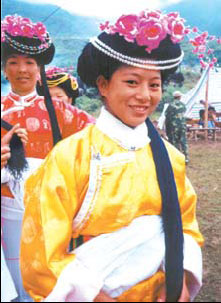| Tools: Save | Print | E-mail | Most Read |
| Beats of a Different Drum |
| Adjust font size: |
During the Qishi Festival which coincides with the Spring Festival, Naxi minroty invite monks to hold sacrificial ceremony for their ancestors at the The most interesting event of the Lisu people's traditional Kuoshi festival is the Hair-Combing Contest held on the first and seventh days of the first lunar month. While men cook breakfast, women dress in bright costumes and put on make up, but don't comb their hair. The whole village gathers to see the women from little girls who have just learnt to comb to elderly ladies who can still hold the comb steady display their long shiny hair and make it into some fancy hairdo. Staged against blossoming peaches, pear and plum trees, the combing is a way of making a wish: Girls generally wish for love and housewives for happiness, peace and bumper harvest. This is one of many celebrations by minorities living in Liangshan, which is part of the north-south running Hengduan Mountains bordering the Qinghai-Tibet Plateau, the Sichuan Basin and the Yunnan-Guizhou Plateau. The geographical diversity of the area has led to a rich cultural diversity, which has been preserved rather well thanks to the difficulty of reaching the area. The Liangshan Yi Autonomous Prefecture in southern Their most important festival is the Torch Festival in summer. But during the Spring Festival, they also stage large group dances and men take on all the family chores to give women a break. Mosuo: Out goes the devil!
Brightly dressed Muoso women at The Mosuo people call their Spring Festival "Kutuo". While most families must prepare pork, mutton and chicken meat, rich families also need at least a yak or a cow for the grand festival. On an auspicious day, the family will clean the house and gather all the rubbish. They then invite a monk to chant some prayers and to make a figure of a demon using fried flour. When the monk throws away the demon figure, the family will also throw their rubbish in that direction in a custom to drive away evil. At the grand meal on New Year's Eve, everyone is expected to eat at least three full bowls of rice before drinking soup. If not, the locals believe the person will be soaked in rain constantly in the coming year. Another local legend goes that a god will descend that night to touch everyone's belly. Anyone sleeping on a half-filled stomach is believed to attract bad luck. On the first day of the New Year, the youngsters will kneel and kowtow to the elderly, who will say things like: "The red-crowned crane lives to 1,000 years old, the wild duck 100 years. The New Year comes like the rising red sun and may you have all happiness and fortune." Each family in the village must choose a day between the first and fifth days of the first lunar month to pay tribute to the ancestors. Three newly picked wild peach branches decorate the altar, where fruits, meat, lantern and other offerings are placed. The whole village is invited to a big banquet after the sacrificial ceremony. Naxi: Sporting spirit On the ninth day of the first lunar month, the Naxi people on the banks of Men walk or ride horses from Besides the Dongba religion, the nearly 1,000 Naxi people in the At night, the Dazu people hold a singing contest. Even children as young as a few years old amaze visitors with their energetic folk songs. After the carnival-style celebrations, the Naxi businessmen are ready to leave home for long trips into (
|
| Tools: Save | Print | E-mail | Most Read |
 |
| Related Stories |
|
Product Directory China Search |
Country Search Hot Buys |

